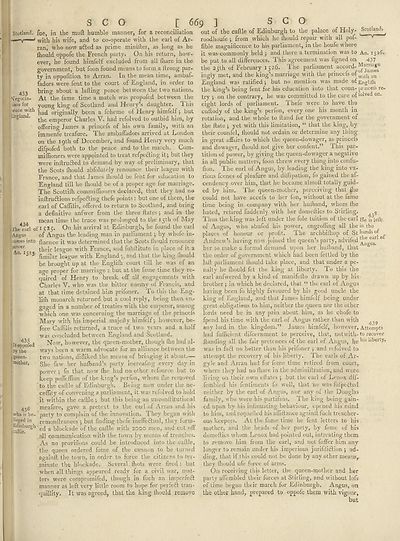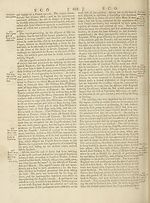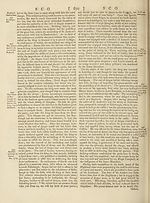Encyclopaedia Britannica, or, a Dictionary of arts, sciences, and miscellaneous literature : enlarged and improved. Illustrated with nearly six hundred engravings > Volume 18, RHI-SCR
(707) Page 669
Download files
Complete book:
Individual page:
Thumbnail gallery: Grid view | List view

SCO
[ 669 ]
SCO
433
^egocia.
ians for
Scotland, foe, in the mo ft humble manner, for a reconciliation
—■ y with his wife, and to co-operate with the earl of Ar¬
ran, who now a£ted as prime minifter, as long as he
(hould oppofe the French party. On his return, how¬
ever, he found himfelf excluded from all (hare in the
government, but foon found means to form a ftrong par¬
ty in oppofition to Arran. In the mean time, ambaf-
fadors were fent to the court of England, in order to
bring about a lafting peace between the two nations.
At the fame time a match was propofed between the
young king of Scotland and Henry’s daughter. This
leace with origJnally been a fcheme of Henry himfelf; but
hng an . ^ emperor Charles V. had refolved to outbid him, by
offering James a princefs of his own family, with an
immenfe treafure. The ambaffadors arrived at London
on the 19th of December, and found Henry very much
difpofed both to the peace and to the match. Com-
mifiioners were appointed to treat refpe&ing it-, but they
were inftru&ed to demand by way of preliminary, that
the Scots fhould abfolutely renounce their league with
France, and that James (hould be fent for education to
England till he fhould be of a proper age for marriage.
The Scottilh commiflioners declared, that they had no
inftrmftions refpefting thefe points : but one ot them, the
earl of Caffilis, offered to return to Scotland, and bring
a definitive anfwer from the three ftates; and in the
mean time the truce was prolonged to the 15th of May
l’h/e;wl of 1525* On his arrival at Edinburgh-, he found the earl
Angus of Angus the leading man in parliament 5 by whofe in¬
comes into fluence it was determined that the Scots fhould renounce
AtTi 2 leaoue with France, and fubftitute in place of it a
' 1525 fimilar league with England -, ,and that the king fhould
be brought up at the Englifh court till he was cf an
age proper for marriage : but at the fame time they re¬
quired of Henry to break off all engagements with
Charles V. who was the bitter enemy of Francis, and
at that time detained him prifoner. To this the Eng¬
lifh monarch returned but a cool reply, being then en¬
gaged in a number of treaties with the emperor, among
which one was concerning the marriage of the princefs
Mary with his imperial majefty himfelf j however, be¬
fore Caffilis returned, a truce of two years and a half
was concluded between England and Scotland.
Now, however, the queen-mother, though fire had al-
wavs been a warm advocate for an alliance between the
two nations, diffiked the means of bringing it about.—
She faw her hufband’s party increafing every day in
power ; fo that now fhe had no other refource but to
keep poffeffion of the king’s perfon, whom fire removed
to the caflle of Edinburgh. Being now under the ne-
ceffity of convening a parliament, it was refolved to hold
it within the caftje but this being an uncon-ftitutional
meafure, gave a pretext to the earl of Arran and his
party to complain of the innovation. They began with
.. remonftranees ; but finding thefe ineffectual, they forra-
S^- ed a blockade of the caftle with 2000 men, and cut oft*
all communication with the town by means of trenches.
As no provifions could be introduced into the caftle,
the queen ordered feme of the cannon to be turned
againft the town, in order to force the citizens to ter¬
minate the blockade. Several fhots were fired : but
when all things appeared ready for a civil war, mat¬
ters were compromifed, though in fuch an imperfedt
manner as left very little room to hope for perfedt tran¬
quillity. It was agreed, that the king fhould remove
Scotland*
435 ,
[3 oppofe u
by the
jueen-
raother,
, 43°
| who is be
fteged in
out of the caftle of Edinburgh to the palace of Holy-
roodhoufe -, from which he fhould repair with all pof-
fible magnificence to his parliament, in the houfe where
it was commonly held ; and there a termination was to An. 1526.
be put to all differences. This agreement was figned on 437
the 25th of February 1526. The parliament accord-damage
ingly met, and the king’s marriage with the princefs of an
England was ratified j but no mention was made of Eolith
the king’s being fent for his education into that coun- pnneeis re¬
try on the contrary, he was committed to the care oflolved on-
eight lords of parliament. Thefe were to have the
cuftody of the king’s perfon, every one his month in
rotation, and the whole to ftand for the government of
the ftate j yet with this limitation, “ that the king, by
their counfel, fhould nut ordain or determine any thing
in great affairs to which the queen-dowager, as princefs
and dowager, fhould not give her confent.” X his par¬
tition of power, by giving the queen-dowager a negative
in all public matters, foon threw every thing into confu.-
fion. The earl of Angus, by leading the king into va¬
rious feenes of pleafure and difhpation, fo gained the af-
cendency over him, that he became alrnoft totally guid¬
ed by him. The queen-mother, perceiving that file
could not have accefs to her fon, without at the fame
time being in company with her hufband, whom fhe
hated, retired fuddenly with her domeftics to Stirling.
Thus the king was left under the foie tuition of the earl ne j/ieft
of Angus, who abufed his power, engroffing all the in the
places of honour or profit. The archbifhop of St hands of ^
Andrew’s having now joined the queen’s party, advifed t'u* e‘i.r oi
her to make a formal demand upon her hulband, that *
the order of government which had been fettled by the
lait parliament fhould take place, and that under a pe¬
nalty he fhould fet the king at liberty. To this the
earl anfwered by a kind of manifefto drawn up by his
brother j in Avhich he declared, that “ the earl of Angus
having been fo highly favoured by his good uncle the
king of England, and that James himfelf being under
great obligations to him, neither the queen nor the other-
lords need be in any pain about him, as he chofe to
fpend his time with the earl of Angus rather than with
any lord in the kingdom.” James hirafelf, however. Attempts
had fufficient difeernment to perceive, that, not with- to recover
(landing all the fair pretences of the earl of Angus, he kls ^kertT*
was in faft no better than his prifoner y and refolved to
attempt the recovery of his liberty. The earls of Ar-
gyle and Arran had for fome time retired from court,
Avhere they had no fhare in the adminiftration, and were
living on their own ertates j but the earl of Lenox dii-
fembled his fentiments fo Avell, that lie was fufpecJed
neither by the earl of Angus, nor any of the Douglas
family, who were his partifans. The king being gain¬
ed upon by his infinuating behaviour, opened his mind
to him, and requelled his affiftance againlt fuch treacher¬
ous keepers. At the fame time he fent letters to his
mother, and the heads of her party, by fome of his
domeftics whom Lenox had pointed out, intreating them
to remove him from the earl, and not fuffer him anv
longer to remain under his imperious jurifdiction ; ad¬
ding, that if this could not be done by any other means,
they (hould ufe force of arms.
On receiving this letter, the queen-mother and her
party affembled their forces at Stirling, and without lofs
of time began their march for Edinburgh. Angus, on
the other hand, prepared to oppofe them with vigour,
but
[ 669 ]
SCO
433
^egocia.
ians for
Scotland, foe, in the mo ft humble manner, for a reconciliation
—■ y with his wife, and to co-operate with the earl of Ar¬
ran, who now a£ted as prime minifter, as long as he
(hould oppofe the French party. On his return, how¬
ever, he found himfelf excluded from all (hare in the
government, but foon found means to form a ftrong par¬
ty in oppofition to Arran. In the mean time, ambaf-
fadors were fent to the court of England, in order to
bring about a lafting peace between the two nations.
At the fame time a match was propofed between the
young king of Scotland and Henry’s daughter. This
leace with origJnally been a fcheme of Henry himfelf; but
hng an . ^ emperor Charles V. had refolved to outbid him, by
offering James a princefs of his own family, with an
immenfe treafure. The ambaffadors arrived at London
on the 19th of December, and found Henry very much
difpofed both to the peace and to the match. Com-
mifiioners were appointed to treat refpe&ing it-, but they
were inftru&ed to demand by way of preliminary, that
the Scots fhould abfolutely renounce their league with
France, and that James (hould be fent for education to
England till he fhould be of a proper age for marriage.
The Scottilh commiflioners declared, that they had no
inftrmftions refpefting thefe points : but one ot them, the
earl of Caffilis, offered to return to Scotland, and bring
a definitive anfwer from the three ftates; and in the
mean time the truce was prolonged to the 15th of May
l’h/e;wl of 1525* On his arrival at Edinburgh-, he found the earl
Angus of Angus the leading man in parliament 5 by whofe in¬
comes into fluence it was determined that the Scots fhould renounce
AtTi 2 leaoue with France, and fubftitute in place of it a
' 1525 fimilar league with England -, ,and that the king fhould
be brought up at the Englifh court till he was cf an
age proper for marriage : but at the fame time they re¬
quired of Henry to break off all engagements with
Charles V. who was the bitter enemy of Francis, and
at that time detained him prifoner. To this the Eng¬
lifh monarch returned but a cool reply, being then en¬
gaged in a number of treaties with the emperor, among
which one was concerning the marriage of the princefs
Mary with his imperial majefty himfelf j however, be¬
fore Caffilis returned, a truce of two years and a half
was concluded between England and Scotland.
Now, however, the queen-mother, though fire had al-
wavs been a warm advocate for an alliance between the
two nations, diffiked the means of bringing it about.—
She faw her hufband’s party increafing every day in
power ; fo that now fhe had no other refource but to
keep poffeffion of the king’s perfon, whom fire removed
to the caflle of Edinburgh. Being now under the ne-
ceffity of convening a parliament, it was refolved to hold
it within the caftje but this being an uncon-ftitutional
meafure, gave a pretext to the earl of Arran and his
party to complain of the innovation. They began with
.. remonftranees ; but finding thefe ineffectual, they forra-
S^- ed a blockade of the caftle with 2000 men, and cut oft*
all communication with the town by means of trenches.
As no provifions could be introduced into the caftle,
the queen ordered feme of the cannon to be turned
againft the town, in order to force the citizens to ter¬
minate the blockade. Several fhots were fired : but
when all things appeared ready for a civil war, mat¬
ters were compromifed, though in fuch an imperfedt
manner as left very little room to hope for perfedt tran¬
quillity. It was agreed, that the king fhould remove
Scotland*
435 ,
[3 oppofe u
by the
jueen-
raother,
, 43°
| who is be
fteged in
out of the caftle of Edinburgh to the palace of Holy-
roodhoufe -, from which he fhould repair with all pof-
fible magnificence to his parliament, in the houfe where
it was commonly held ; and there a termination was to An. 1526.
be put to all differences. This agreement was figned on 437
the 25th of February 1526. The parliament accord-damage
ingly met, and the king’s marriage with the princefs of an
England was ratified j but no mention was made of Eolith
the king’s being fent for his education into that coun- pnneeis re¬
try on the contrary, he was committed to the care oflolved on-
eight lords of parliament. Thefe were to have the
cuftody of the king’s perfon, every one his month in
rotation, and the whole to ftand for the government of
the ftate j yet with this limitation, “ that the king, by
their counfel, fhould nut ordain or determine any thing
in great affairs to which the queen-dowager, as princefs
and dowager, fhould not give her confent.” X his par¬
tition of power, by giving the queen-dowager a negative
in all public matters, foon threw every thing into confu.-
fion. The earl of Angus, by leading the king into va¬
rious feenes of pleafure and difhpation, fo gained the af-
cendency over him, that he became alrnoft totally guid¬
ed by him. The queen-mother, perceiving that file
could not have accefs to her fon, without at the fame
time being in company with her hufband, whom fhe
hated, retired fuddenly with her domeftics to Stirling.
Thus the king was left under the foie tuition of the earl ne j/ieft
of Angus, who abufed his power, engroffing all the in the
places of honour or profit. The archbifhop of St hands of ^
Andrew’s having now joined the queen’s party, advifed t'u* e‘i.r oi
her to make a formal demand upon her hulband, that *
the order of government which had been fettled by the
lait parliament fhould take place, and that under a pe¬
nalty he fhould fet the king at liberty. To this the
earl anfwered by a kind of manifefto drawn up by his
brother j in Avhich he declared, that “ the earl of Angus
having been fo highly favoured by his good uncle the
king of England, and that James himfelf being under
great obligations to him, neither the queen nor the other-
lords need be in any pain about him, as he chofe to
fpend his time with the earl of Angus rather than with
any lord in the kingdom.” James hirafelf, however. Attempts
had fufficient difeernment to perceive, that, not with- to recover
(landing all the fair pretences of the earl of Angus, he kls ^kertT*
was in faft no better than his prifoner y and refolved to
attempt the recovery of his liberty. The earls of Ar-
gyle and Arran had for fome time retired from court,
Avhere they had no fhare in the adminiftration, and were
living on their own ertates j but the earl of Lenox dii-
fembled his fentiments fo Avell, that lie was fufpecJed
neither by the earl of Angus, nor any of the Douglas
family, who were his partifans. The king being gain¬
ed upon by his infinuating behaviour, opened his mind
to him, and requelled his affiftance againlt fuch treacher¬
ous keepers. At the fame time he fent letters to his
mother, and the heads of her party, by fome of his
domeftics whom Lenox had pointed out, intreating them
to remove him from the earl, and not fuffer him anv
longer to remain under his imperious jurifdiction ; ad¬
ding, that if this could not be done by any other means,
they (hould ufe force of arms.
On receiving this letter, the queen-mother and her
party affembled their forces at Stirling, and without lofs
of time began their march for Edinburgh. Angus, on
the other hand, prepared to oppofe them with vigour,
but
Set display mode to:
![]() Universal Viewer |
Universal Viewer | ![]() Mirador |
Large image | Transcription
Mirador |
Large image | Transcription
Images and transcriptions on this page, including medium image downloads, may be used under the Creative Commons Attribution 4.0 International Licence unless otherwise stated. ![]()
| Permanent URL | https://digital.nls.uk/193027898 |
|---|
| Attribution and copyright: |
|
|---|
| Description | Ten editions of 'Encyclopaedia Britannica', issued from 1768-1903, in 231 volumes. Originally issued in 100 weekly parts (3 volumes) between 1768 and 1771 by publishers: Colin Macfarquhar and Andrew Bell (Edinburgh); editor: William Smellie: engraver: Andrew Bell. Expanded editions in the 19th century featured more volumes and contributions from leading experts in their fields. Managed and published in Edinburgh up to the 9th edition (25 volumes, from 1875-1889); the 10th edition (1902-1903) re-issued the 9th edition, with 11 supplementary volumes. |
|---|---|
| Additional NLS resources: |
|

